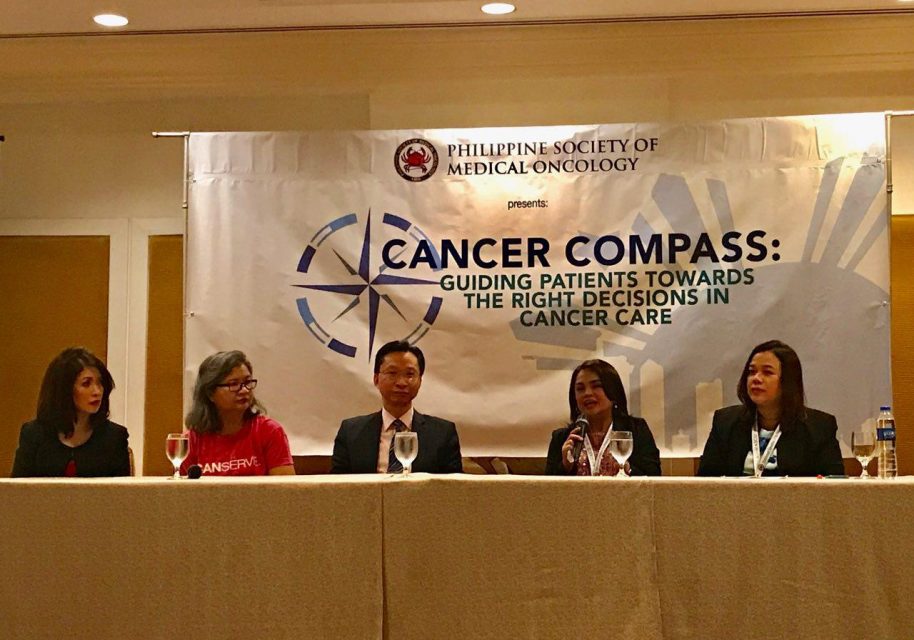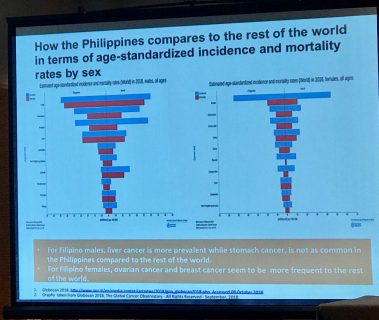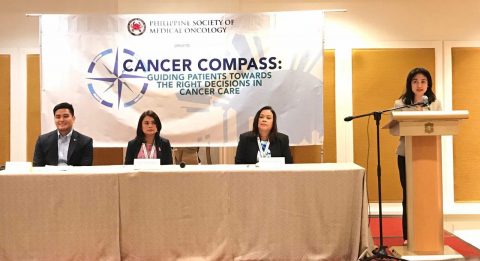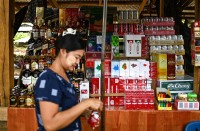
By Caesar Vallejos, Eagle News Service
In the Philippines, more than 141,000 cancer cases and 86,337 cancer deaths were reported in 2018 alone.
Among the leading causes of cancer in the country, lung, liver and cervix are preventive while the breast and colorectal cancers can be cured if detected early, the Philippine Society of Medical Oncology (PSMO) statement said at the press gathering called “Cancer Compass: Guiding Patients Towards the Right Decisions in Cancer Care” held at the Edsa Shangri-La last October 11, 2018.
Citing data from the World Health Organization (WHO) cancer country profile, Dr. Claire V. Soliman, PSMO president said that, “the ideal is a line that goes down, meaning lesser people are dying of that kind of cancer but unfortunately, ours is going up.”
This means that “we are not detecting them early, we are not doing anything about it and there are more people dying of the disease even if we know that we are getting more of them,” the PSMO President said.
“The only way we can achieve cure and long term survival for cancer patients is to find the cancer at its early stage,” Dr. Soliman added. Once the cancer is diagnosed at stage four, she said that it is already “too late and too expensive to extend the life of the patients.”
The other reason of the increasing mortality rate in the Philippines is access to care. “The potential financial toxicity is a given and a reality here in the Philippines. So the patients just decide not to go to the doctors knowing that they have no finances to support their treatment,” Dr. Soliman said.
“More males are dying of prostate cancer while more females are dying of colorectal cancer,” Soliman added. For men, the top cancer sites are lung, colorectal, prostate and liver while the breast, cervix, colorectal, lung and ovary are for women.
Key factors to treat patient successfully
 Soliman cited that four key factors that need to be in place for patients to be treated successfully: disease awareness, diagnoses, healthcare capacity and government intervention.
Soliman cited that four key factors that need to be in place for patients to be treated successfully: disease awareness, diagnoses, healthcare capacity and government intervention.
“We have a lot of world-class cancer treatment modalities in the Philippines,” she said. Soliman also mentioned the Philippines is not behind in terms of equipment. “The only problem is availability and the patients’ access to these machines nationwide.”
The PSMO president noted that in the past, “we used to have one-size-fits-all type of treatment”. Subsequently, “we went into stratified medicine and nowadays, into precision medicine by trying to treat cancer based on patient’s genetic problems.”
Past PSMO President, Dr. Ellie May Villegas also said that there are more 100 different types of cancers and no one treatment can cure for every person or every type of cancer. Even twins are different, how much more in two different individuals,” Villegas stressed.
“Not all treatments will cure cancer because not all cancers are curable but there is a way to control cancer and make cancer patients to live better if not live longer,” Dr. Villegas said.
The pursuit of better cancer care requires a multi-disciplinary team approach.
Dr. Soliman said that “a cancer cannot be treated by one doctor alone. You have to have a group of people working hand on hand. As it takes a village to bring up a kid, it also takes a team of doctors and experts to take care of a cancer patient.” Soliman cited many modalities that the patient can be treated including surgery and radiation therapy from experts that include radiation oncologists, medical oncologists and surgeons.
Compass on treatments
Dr. Villegas presented “The Stoplight of Cancer Care” which aimed to provide a compass on treatments underscoring what is safe and what is proven and emphasized to look at integrated cancer care.
“Find out who is recommending the treatment, not your neighbor. Even if your neighbor is a doctor, it has to be a medical doctor, a cancer expert who should be discussing anti-cancer treatments available. If you find only personal stories with no trustworthy research, then the treatment probably does not treat cancer. It cannot be anecdotes and testimonials,” Dr. Villegas said.
 “If news or ads about a treatment appear on mass media but in scientific journals, it is unlikely to help treat cancer. If a treatment promises to treat all cancers, then that ad is fraud,” Dr. Villegas warned.
“If news or ads about a treatment appear on mass media but in scientific journals, it is unlikely to help treat cancer. If a treatment promises to treat all cancers, then that ad is fraud,” Dr. Villegas warned.
“Patients who chose alternative methods of treatment instead of standard research-backed cancer care can face several risks including unknown side effects, safety and effectivity issues, quality control concerns, and potentially allowing tumors and cancer to spread,” she added.
On the other hand, Dr. Soliman said that the reason why they patients go to alternative medicine practitioners first is that,” they think it is cheaper not knowing that it turns out to be more expensive and at the end of the day, not effective at all.”
“By the time they go to the real oncologists who really take care of the cancer patients, the cancer is already in the advanced stage,” she said.
PSMO emphasizes that products and therapies that do not have approval from the Food and Drug Administration are unlikely to help and may even be harmful or interfere with doctor-prescribed treatments.
Aid for cancer patients
“With all the new innovations available, cancer need not be a death sentence,” PSMO said.
Congressman Alfred Vargas, whose mother died of cancer in the uterus, discussed the government support and aid for cancer patients.
He presented the House Bill that he authored called the National Integrated Cancer Control Program.
“The good news is that it has already been approved in the second reading in the Senate and in the House of Congress, has undergone committee discussions, including health, appropriations and ways and means.” Congressman Vargas said.
If enacted as Law, there will be automatic appropriations of P30B for the Cancer Assistance Fund that will provide financial access to Filipino cancer patients especially those in the marginalized section of the society.







